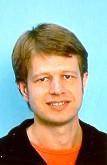Glotzbach, Ulrich | Germany

ULRICH Glotzbach was born in 1966 in Simmershausen (GER), where people are used to knowing each other. Nearby, the borders of Hesse, Thuringia and Bavaria join together in the hilly Rhön shaped by volcanic activity in pre-historic times.
He was a short-term student of chemistry in Würzburg (GER) and completed studies in philosophy and electrical engineering in Cape Town (RSA) and Berlin (GER). He holds a university diploma in electrical engineering and has worked as an engineer in research and development since he graduated from university in 1996.
In engineering, Glotzbach concentrated first on solar energy (photovoltaics and solar thermal energy conversion). For example, he developed a solar sewing workstation in South Africa while working at the Cape Technikon (RSA) and re-designed, with the Institute Synopsis (FR), a more efficient solar cooker now in small-series production. After that he worked in a major research project at Witten/Herdecke University (GER) on eco-product development and the greening of production in the electric and electronics industry.
Realizing that successful eco-product development needs to start from the very centre of technological development, Glotzbach shifted his professional focus to cutting-edge technologies, e.g. the application of lasers and design of electronic micro-systems. He instigated, and is pursuing, a multi-partner project concerning the micro-miniaturization of switch-mode power supplies. The goal of this particular project is to develop a ready-to-market, high-efficient product to do away with the energy-wasting, socket-heating wall packs. Recently, he prepared a project on merging electronics and textiles for industry applications.
In philosophy, he completed courses on philosophy of mind, phenomenology and ontology. In 1993, as a student, he organized an engineering students' working group on critical approaches to technology. He brought to discussion arguments of the former Humanities Philosophy of Technology (Mumford, Ortega, Giedeon, …). Later he focussed on recent theories of innovation, taking up threads in sociology of technology, history of technology and cultural anthropology. In 2000, at Witten/Herdecke University, he began working on a thesis which paves a way from a culturalistic model of technology rise and shaping to clues for socially responsible product development. In October 2002, he was appointed a fellow of the IAS-STS.
Project at IAS-STS: Modelling Technology Rise and Shaping: Technological Style in Product Development
The study challenges the view that technology, as a persistent human project, is strictly fenced in by the laws of nature and that therefore only two kinds of technology exist: successful technology evidencing the truth of the laws of nature and unsuccessful technology not properly thought through. In opposition to this view, I assume that the development of any technical artefact whatsoever is embedded in a cultural setting and will be particularly structured in the course of development by supra-individual factors, individually exemplified in everyday face-to-face communication. Perhaps the most eminent of those factors, being at the same time a cognitive factor and a pattern of behaviour at both the individual and the group level, is the individually practised but essentially collective thought style (L. Fleck). That basically means technological development is open to embody different technological styles, relating to an infinite variety of possible thought styles. However, my impression is that most if not all of our contemporary technological undertakings are governed by just one pre-eminent thought style (providing false evidence for the assumption that there is only one technology possible).
In that situation, with single-style dominance making wording difficult (there is no word for blue if everything is blue), the study ventures to model culturalistically salient features of technology rise and shaping, to derive from the model eventually some clues for socially responsible engineering. The goal may be achieved by seriously taking into account life-world routines of engineering, on both the individual and the group level. The study is in progress. So far, the cross-cultural variable - the most basic conceptual segregation of humans and things - has unfolded as the study's central and key phenomenon. By shifting the line between humans and things, you get all those well-known theories, from man-the-toolmaker to the lone individuum lost in some big machine, to even the total dissolution of the individual in systems theory.
For improving ethical decision-making on the nitty-gritty level of everyday engineering, we need something like a blind person's cane, which realistically can't be a technical norm nor a code of ethics. I imagine this helpful cane could be made from reflective consciousness of technological styles, accompanied by an awareness of their habitual grounds in metaphorical thinking, for instance, which always correlates with specifically patterned routine behaviour. This, then, is also a question of the existence of behavioural alternatives at the individual level. Hence, the study is considered to finally contribute to the question whether engineers, as professionals, have a special responsibility to the public.
Selected Publications
U. Glotzbach, E.-A. Uken, RSA Patent Application No. 953217, Solar Sewing Workstation, Pretoria 1995
E.-A. Uken, U. Glotzbach, A Stand-alone Photovoltaic Drive System for Microenterprises, International Photovoltaic Conference, Denver Colorado, 1996
U. Glotzbach, E.K. Wolff, From Green to Market: An Eco-Integrated Wall-Pack Concept, in: H. Reichl, H. Griese (eds.), Electronics Goes Green 2000+, Berlin 2000
U. Glotzbach, E. K. Wolff, A. Middendorf, H. Griese, T. Funk, V. Geneiß, European Patent Application EP 01108599.0, Vorrichtung zur Transformation einer Primärspannung in eine Sekundärspannung mit mindestens einem Schaltnetzteil, 2001
